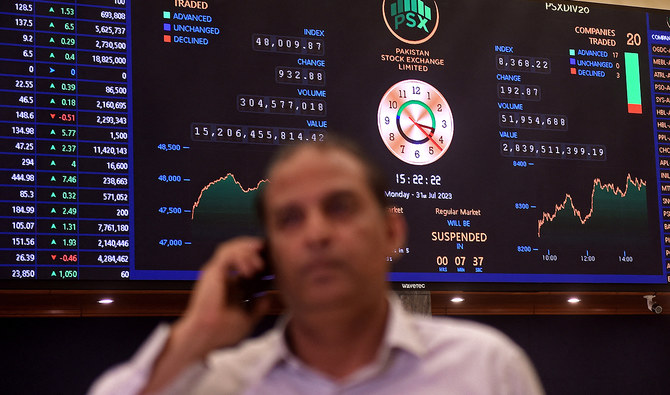KARACHI: The Pakistan Stock Exchange (PSX) on Friday hit a new high and crossed 59,000-point mark during the intraday trade, with market analysts attributing it to hopes of a $700 million loan disbursement by the International Monetary Fund (IMF).
The benchmark KSE-100 index was at 59,398 points at around noon, recording an increase of 498 points or 0.85 percent, compared to the previous day’s close of 58,899 points.
Analysts say the euphoria at Pakistan’s bourse was not merely a numerical milestone but a reflection of newfound optimism, made possible by successful completion of the IMF short-term financing program review that has reshaped the market sentiment.
“The investor confidence, fueled by optimism that the interests rate have peaked out that would lead to the easing of monetary policy, and the liquidity in the market is also abundant because people are gradually moving from fixed income to long-tenure investment avenues,” Shahid Ali Habib, CEO of the Karachi-based Arif Habib Limited brokerage house, told Arab News on Friday.
“It was not imaginable even some six months back that the market will soon hit new highs because of the economic conditions, but the $3 billion IMF bailout agreement and reforms undertaken by the caretaker government have played critical in pushing the index to record highs.”
The IMF this month announced it had reached a staff-level agreement with Pakistan on the first review of a nine-month standby arrangement (SBA), paving the way for Islamabad to receive a second tranche of around $700 million from the lender.
Pakistan and the IMF signed the $3 billion standby arrangement (SBA) in July this year. Islamabad has already received $1.2 billion from the Fund and is expecting another $700 million after a formal approval by the IMF’s executive board.
Habib said the decline in rupee-dollar parity and increase in profitability of companies had further strengthened the market sentiment, translating into a bullish trend.
“The rupee-dollar parity is in control and stable which signals that the dollarization has substantially halted,” he said.
“Profitability of companies has substantially increased, while dividend payouts and buybacks of shares by some blue chip companies have also played a key role in fueling the overall sentiment at the market.”




















